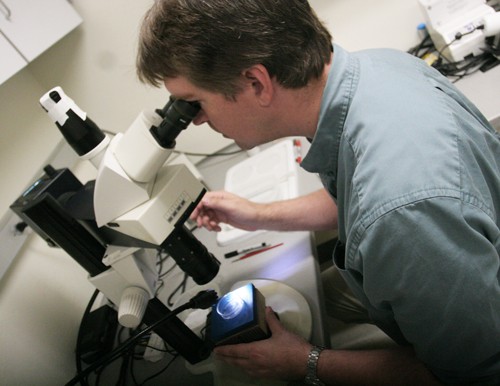A UA lab successfully engineered mosquitoes unable to transmit malaria last year. Now, researchers are trying to understand exactly how it happened while getting mixed reactions from national media.
This month, Time Magazine picked the research as one of its top 50 inventions of 2010.
Michael Riehle, an associate professor of entomology, and his team were surprised when in their first try, there were no malaria-causing parasites in the mosquitoes. By increasing insulin-signaling genes and regulating it in the mosquito’s gut, they were able to completely kill the parasite it carries.
Although this is not the first type of malaria-resistant mosquitoes developed, it is the first one to completely block the parasite, Riehle said. DNA targeting the parasite and other control measures such as shortening life span are injected in mosquito eggs.
For mosquito-borne diseases, malaria is one of the most important ones worldwide, infecting one to 3 million people annually, he said.
But the biggest challenge is still ahead of them: The ultimate goal is to replace wild mosquito populations with transgenic ones without the parasite.
“”Current control strategies (like) insecticides, bed nets, they work great. But as soon as the control measures stop — because you’ve pretty much wiped out all the mosquitoes in the area — and create this ecological void, they come right back,”” he said.
The idea that entire mosquito populations could be genetically modified to prevent one of the most important infectious diseases was not entirely well-received. Newsweek magazine published an opinion piece in August criticizing the “”God””-type research and the possible effects of releasing the mosquitoes would have in the environment.
Riehle doesn’t foresee any major disasters over it.
“”If you go in and wipe out mosquito populations with DDT, I’d imagine that would have a much greater impact,”” he said.
Before transgenic mosquitoes are released, extensive testing would take place. They would first be tested in secure greenhouses in malaria-endemic areas, then in a geographically isolated area, like an island.
They must also ensure the gene preventing the parasite is inherited by 100 percent of the progeny.
“”You hear lots of horror stories about gigantic mosquitoes coming out of genetically engineered organisms,”” Riehle said; “”at the end of the day, this is the exact same mosquito except for the addition of this small piece of DNA on their genome.””
The research is a collaborative effort with the University of California, Davis, where researchers insert the plasmodium parasite and see the impacts of the DNA piece included. At the UA, the research focuses on mosquito longevity and reproduction, which made the success in eradicating the parasite surprising, Yevgeniya Antonova said.
Antonova, an entomology research associate, has been involved in the study for two years. One key element in proving its effectiveness was showing transgenic mosquitoes’ “”fitness”” wasn’t reduced by the new gene, she said.
The new gene would not prevent the mosquitoes from being released in the wild and be able to survive.
Transgenic mosquitoes do lead a shorter life, something Riehle thought of, she said. The reason for that is in the amount of time it takes for the parasite to grow. Shortening the life span in “”at least two days”” will make the parasite unable to fully develop and infect someone.
The possibility of putting an end to malaria made Antonova join the project, with the transgenic element being something new and stimulating, she said.
“”I don’t know what we will win, in the way that people will develop vaccines … or try to kill all the mosquitoes,”” Antonova said. “”But if altogether we collaborate efforts, maybe we’ll be able to stop malaria at some point.””









